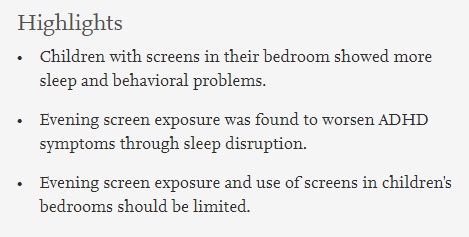Screen exposure exacerbates ADHD symptoms indirectly through increased sleep disturbance. Cavalli, Eddy; Anders, Royce; Chaussoy, Louise; Herbillon, Vania; Franco, Patricia; Putois, Benjamin; Sleep Medicine 2021/03/13 https://www.sciencedirect.com/science/article/pii/S1389945721001714

Abstract
Objectives
The aim of this study was twofold. First, to confirm the deleterious aspect of evening screen exposure in school-aged children, in particular the effect of screens in the bedroom. Second, to explore the three-way association between degree of screen exposure, sleep disturbance, and ADHD symptoms. Strong evidence exists on the link between sleep disturbance and ADHD symptoms, and screen exposure and sleep disturbance. However, no studies have formally assessed the impact of screen exposure on ADHD symptoms in children, as a function of sleep disturbance.
Methods
Parents of 374 French children (201 girls, 173 boys, mean age of 10.8 +/- 2.8 years old) completed the Sleep Disturbance Scale for Children (SDSC), the Attention-Deficit/Hyperactivity Disorder (ADHD) Rating Scale, and a questionnaire about their children’s screen habits (total hours in the morning, afternoon, and evening per day). Correlational analyses between evening screen exposure, sleep quality and behavioral problems were conducted. Then, formal mediation analyses were run in order to quantify the relationship between variables.
Results
School-aged children with screens in their bedrooms demonstrated more sleep and behavioral problems. Evening TV exposure is associated with higher SDSC and ADHD scores. Furthermore, the Structural Equation Modelling approach confirmed that evening screen exposure directly disturbs sleep, which in-turn notably disturbs daytime attention/behaviors.
Conclusions
These findings encourage families to avoid putting screens in their children’s bedrooms, and limit evening screen exposure. They furthermore demonstrate the importance of taking into account screen exposure time (morning, afternoon, evening) and place (bedroom or elsewhere) in future studies.
https://www.sciencedirect.com/science/article/abs/pii/S1389945721001714
